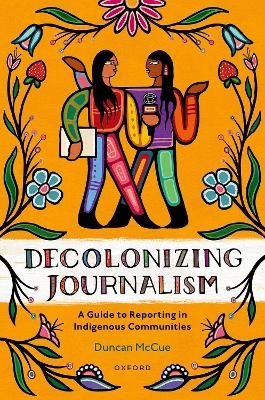
Decolonizing Journalism
Oxford University Press, Canada (Verlag)
978-0-19-016426-3 (ISBN)
- Lieferbar
- Versandkostenfrei
- Auch auf Rechnung
- Artikel merken
Duncan McCue is an award-winning journalist, author, and journalism professor. His radio and television career at the Canadian Broadcasting Corporation (CBC) spans over two decades, most recently serving as host of CBC Radio's national phone-in program Cross Country Checkup. A proud Anishinaabe from the Chippewas of Georgina Island First Nation in southern Ontario, Duncan is the recipient of an Indspire Award for Public Service and an honorary doctorate from the University of King's College.
About the Author
Foreword
Acknowledgements
Contributors
A Brief History of Indigenous Relations in Canada
1) AT THE DESK
1.1 First Contact
1.2 Historical News Stereotypes of Indigenous Peoples
1.3 Beyond Victims and Warriors
1.4 Positive and Negative Stories
1.5 Searching for Solutions
1.6 How to Pitch Stories, Successfully
1.7 "Where Are You From?" - Rethinking Objectivity
2) IN THE FIELD
2.1 Indian Time
2.2 Indigenous Customs and Protocols
2.3 Who Represents the "Indigenous Perspective"?
2.4 White Characters and Indigenous Agency
2.5 Trauma-Informed Reporting
2.6 Story-Takers - How to Deal with 500+ Years of Rage
2.7 Breaking News - Indians Are Funny!
3) ON THE AIR
3.1 Terminology and Lexicon
3.2 Context and Colonial Amnesia
3.3 Accountability, Reciprocity, and Criticism
3.4 Social Media - The New Moccasin Telegraph
3.5 Reconciliation and Journalism
4) TEACHINGS
4.1 Becoming Trauma-Informed - A Conversation with Connie Walker
4.2 Lessons in Humility - A Conversation with Waubgeshig Rice
4.3 "In Love with My People" - A Conversation with Mark Trahant
4.4 Northern Reflections - A Conversation with Juanita Taylor
4.5 Respect and Relationships - A Conversation with Tanya Talaga
4.6 In Pursuit of Truth - A Conversation with Karyn Pugliese
4.7 Punching Up - A Conversation with Tim Fontaine
4.8 The Need for Knowledge-Based Journalism - A Conversation with Merelda Fiddler-Potter
4.9 Asking Hard Questions - A Conversation with Tristan Ahtone
Conclusion: The Last Word
Appendix 1: UNDRIP Articles Relating to Media
Appendix 2: TRC Calls to Action Relating to Media
Appendix 3: OCAP Principles for Indigenous Research and Data Collection
Appendix 4: Residential School Apology
Additional Resources
Bibliography
Index
| Erscheinungsdatum | 04.10.2022 |
|---|---|
| Zusatzinfo | 16 photos, 2 tables |
| Sprache | englisch |
| Maße | 154 x 236 mm |
| Gewicht | 410 g |
| Themenwelt | Sozialwissenschaften ► Kommunikation / Medien ► Journalistik |
| ISBN-10 | 0-19-016426-3 / 0190164263 |
| ISBN-13 | 978-0-19-016426-3 / 9780190164263 |
| Zustand | Neuware |
| Haben Sie eine Frage zum Produkt? |
aus dem Bereich


